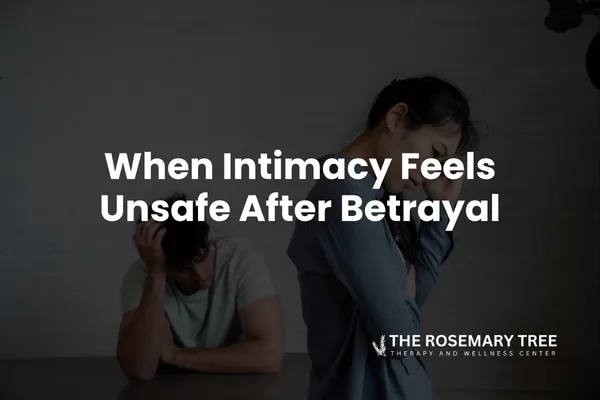
When Intimacy Feels Unsafe After Betrayal
The Moment You’re Finally Ready, But Still Afraid
After betrayal, rebuilding trust takes time, but even once that trust begins to grow, another challenge often appears: intimacy feels different.
You may want to be close, yet your body tenses up. You might long for affection but feel waves of anxiety instead of comfort. These reactions can leave both partners confused and hurt, wondering if things will ever feel normal again.
This is one of the most misunderstood parts of relationship recovery.
Physical and emotional intimacy cannot return until safety has been rebuilt, and that safety must exist not only in the mind, but in the body.
Why Intimacy Feels Unsafe After Betrayal
When trust is broken, the brain and body record the event as danger. Even after forgiveness begins, your nervous system may still associate closeness with risk.
Moments that once felt safe, like eye contact, touch, or physical closeness, can now trigger memories of pain or fear.
This doesn’t mean you’re broken. It means your body is still protecting you.
The same way we discussed the “fight, flight, freeze, or fawn” response in the Betrayal Trauma and PTSD blog, these physiological reactions can resurface during attempts at intimacy.
The key is not to push through it, but to slow down and rebuild a sense of safety, one step at a time.
Emotional Safety Comes First
Intimacy is not only physical. It begins emotionally. When both partners feel emotionally connected, the body begins to relax again.
That’s why attachment repair, which we explored in the Recovery Through Attachment Work series, is so essential. Secure attachment teaches your nervous system that connection can exist without threat.
You rebuild emotional safety by:
Checking in with your partner’s comfort level before and during closeness
Expressing your needs clearly (“I want to be close, but I feel nervous”)
Responding with empathy, not pressure, when your partner hesitates
Sharing appreciation for small moments of connection
These gentle, consistent interactions tell both partners: It’s safe to be here.
Why “Going Slow” Is Not Avoidance
Many couples feel discouraged when intimacy doesn’t return quickly. They may worry that the relationship is doomed or that attraction is gone. But slow is not failure, it’s wisdom.
Healing requires patience. Emotional connection must rebuild before physical connection can feel safe again.
When you slow down, you give your nervous system the chance to trust that closeness no longer equals danger.
How to Rebuild Safe Intimacy Together
Start with Nonsexual Touch
Begin with simple, safe contact, holding hands, hugging, or sitting close. Focus on comfort and connection rather than outcome.Talk About What Feels Safe
Have open conversations about boundaries and readiness. Intimacy after betrayal only works when both people feel emotionally and physically respected.Recognize and Name Triggers
If you notice anxiety, sadness, or flashbacks, pause. Talk about it gently without judgment. Naming a trigger reduces its power.Breathe and Ground Together
Slow, shared breathing can help calm both bodies. This co-regulation strengthens trust and lowers stress hormones.Celebrate Small Wins
Every moment of closeness, a hug, laughter, eye contact, is progress. Healing intimacy happens in small, meaningful steps.
How Therapy Intensives Support This Stage
Our Accelerated Deep-Work Therapy Intensives are designed to help couples navigate these exact transitions.
During an intensive, couples can:
Understand how trauma affects physical connection
Learn tools for emotional regulation during intimacy
Rebuild trust through guided exercises
Create personalized plans for safe, connected physical closeness
These sessions allow both partners to slow down and feel safe in each other’s presence again, emotionally, mentally, and physically.
When Fear Feels Stronger Than Desire
It’s normal to wonder if you’ll ever feel “in love” again. But fear does not mean the love is gone, it means your body needs more time to believe it’s safe to love again.
Intimacy after betrayal is not about forcing passion to return. It’s about creating conditions where desire can grow naturally from safety, honesty, and peace.
Final Thoughts
Intimacy is one of the first things broken by betrayal and one of the last to return, but it can return. With compassion, patience, and guidance, couples can rediscover closeness that feels safer and more authentic than before.
If you’re ready to begin this next step in your healing journey, we would love to support you. You can reach out to us here, and our team will connect with you to talk about what this process could look like. There is no pressure, only a space to begin reconnecting with care and understanding.


